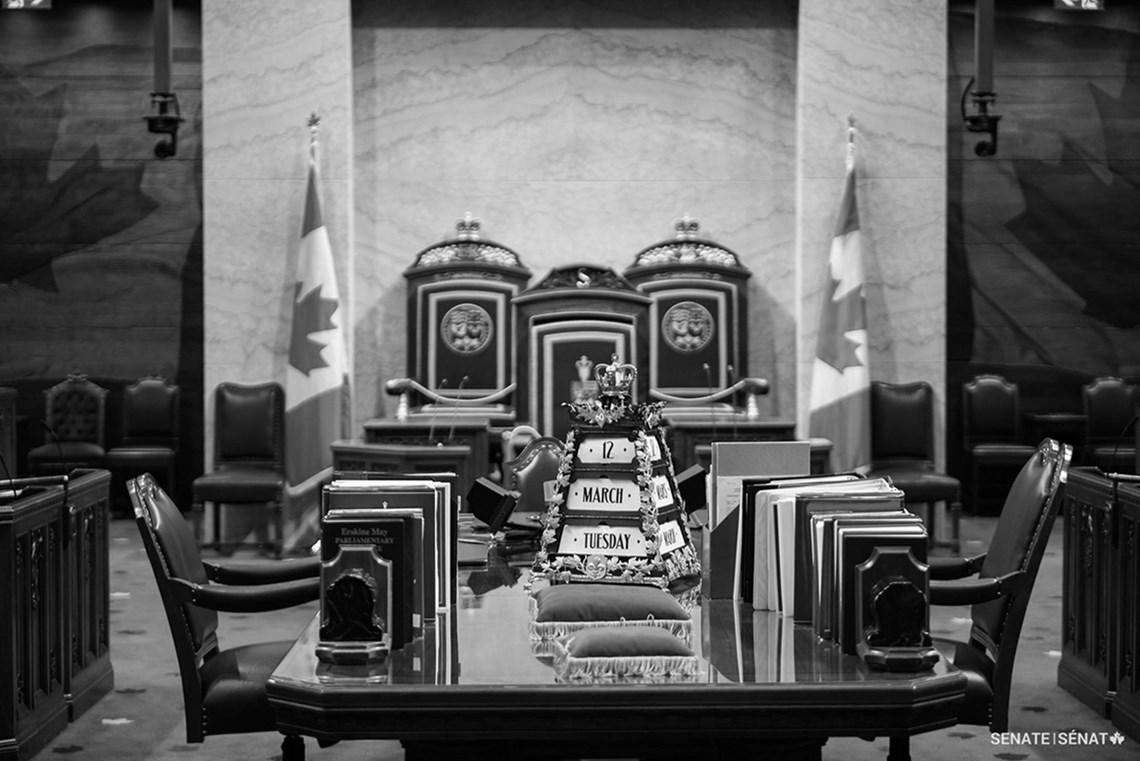Committee
Designation or establishment
35. (1) At the beginning of each session, a Committee of the Senate shall be designated or established for the purposes of this Code.
Membership
35. (2) The Committee shall be composed of five members, three of whom shall constitute a quorum.
No ex officio members
35. (3) The Committee shall have no ex officio members.
Election of members
35. (4) Two of the Committee members shall be elected by secret ballot in the caucus of Government Senators at the opening of the session; two of the Committee members shall be elected by secret ballot in the caucus of Opposition Senators at the opening of the session; the fifth member shall be elected by the majority of the other four members after the election of the last of the other four members.
Presentation and adoption of motion
35. (5) The Leader or Representative of the Government in the Senate, seconded by the Leader of the Opposition in the Senate and the leader or facilitator of the recognized party or recognized parliamentary group with the most members — other than, if applicable, the recognized parties or recognized parliamentary groups to which either the Leader or Representative of the Government in the Senate, or the Leader of the Opposition in the Senate belongs — shall present a motion on the Committee’s full membership to the Senate, and that shall be deemed adopted without any debate or vote.
Chair
35. (6) The Chair of the Committee shall be elected by four or more members.
Removal
35. (7) A member is deemed removed from the Committee as of the time that
(a) the Senate Ethics Officer informs the Committee that a request for an inquiry made by the Senator is warranted; or
(b) the Senator becomes the subject of an inquiry under the Code.
Substitutions
35. (8) When a vacancy occurs in the membership of the Committee, the replacement member shall be elected by the same method as the former member being replaced.
Meetings in camera
36. (1) Subject to subsection (2), meetings of the Committee shall be held in camera.
Meetings in public
36. (2) Where an inquiry report from the Senate Ethics Officer is being considered, the Committee may hold meetings in public at the request of the Senator who is the subject of the inquiry report.
Attendance
36. (3) Subject to subsection (4), the Committee may limit attendance at its meetings.
Affected Senator
36. (4) The Committee shall give to a Senator who is the subject of an inquiry report from the Senate Ethics Officer notice of all meetings at which the report is being considered, and shall admit the Senator to those meetings, but the Committee may exclude that Senator from those meetings or portions of meetings at which the Committee is considering a draft agenda or a draft report.
Withdrawal
36. (5) A member of the Committee who is the subject of a matter being considered by the Committee relating to that specific Senator shall withdraw from the Committee during its deliberations.
Jurisdiction
37. (1) Subject to subsection 41(2) and to the general jurisdiction of the Senate, the Committee is responsible for all matters relating to this Code, including all forms involving Senators that are used in its administration.
Exception - non-substantive modifications
37. (1.1) Despite subsection (1), the Senate Ethics Officer may make non-substantive modifications to a form approved by the committee to
(a) correct grammatical and typographical errors;
(b) insert or revise cross-references; and
(c) improve its readability or formatting.
General directives
37. (2) The Committee may, after consultation with the Senate Ethics Officer, give general directives to the Senate Ethics Officer concerning the interpretation, application and administration of the Code, but not concerning its interpretation and application as it relates to an individual Senator’s particular circumstances.

